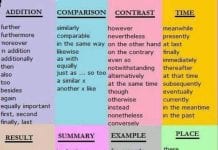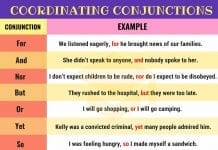👉 Prefix Meaning
Prefix is a letter or a group of letters that appears at the beginning of a word and changes the word’s original meaning.
Prefix Meaning Translation
English  | Prefix is a letter or a group of letters that appears at the beginning of a word and changes the word’s original meaning. |
Spanish | El prefijo es una letra o un grupo de letras que aparece al principio de una palabra y cambia su significado original. |
French | Le préfixe est une lettre ou un groupe de lettres qui apparaît au début d’un mot et qui en modifie le sens initial. |
Italian | Il prefisso è una lettera o un gruppo di lettere che appare all’inizio di una parola e cambia il significato originale della parola. |
German | Eine Vorsilbe ist ein Buchstabe oder eine Gruppe von Buchstaben, die am Anfang eines Wortes erscheint und die ursprüngliche Bedeutung des Wortes verändert. |
Portuguese | Prefixo é uma letra ou um grupo de letras que aparece no início de uma palavra e altera o significado original da palavra. |
Russian | Префикс – это буква или группа букв, которая появляется в начале слова и изменяет его исходное значение. |
Chinese | 前缀是指出现在单词开头的一个字母或一组字母,它改变了单词的本义。 |
Japanese | 接頭辞とは、単語の先頭に現れ、その単語の本来の意味を変える文字または文字群のことです。 |
Polish | Przedrostek to litera lub grupa liter, która pojawia się na początku słowa i zmienia jego pierwotne znaczenie. |
| Hungarian | Az előtag olyan betű vagy betűcsoport, amely egy szó elején jelenik meg, és megváltoztatja a szó eredeti jelentését. |
| Swedish | Prefix är en bokstav eller en grupp av bokstäver som står i början av ett ord och ändrar ordets ursprungliga betydelse. |
👉 Suffix Meaning
What is the Suffix?
Suffix is a letter or a group of letters that is usually added onto the end of words, to change the way a word fits into a sentence grammatically.
Suffix Meaning Translation
English  | Suffix is a letter or a group of letters that is usually added onto the end of words, to change the way a word fits into a sentence grammatically. |
Spanish | El sufijo es una letra o un grupo de letras que se suele añadir al final de las palabras, para cambiar la forma en que una palabra encaja gramaticalmente en una frase. |
French | Le suffixe est une lettre ou un groupe de lettres qui est généralement ajouté à la fin d’un mot, afin de modifier la façon dont ce mot s’intègre dans une phrase sur le plan grammatical. |
Italian | Il suffisso è una lettera o un gruppo di lettere che di solito viene aggiunto alla fine delle parole, per cambiare il modo in cui una parola si inserisce grammaticalmente in una frase. |
German | Ein Suffix ist ein Buchstabe oder eine Gruppe von Buchstaben, die normalerweise an das Ende von Wörtern angehängt wird, um die Art und Weise zu ändern, wie ein Wort grammatikalisch in einen Satz passt. |
Portuguese | Sufixo é uma letra ou um grupo de letras que é normalmente adicionado no final das palavras, para alterar a forma como uma palavra se encaixa numa frase gramaticalmente. |
Russian | Суффикс – это буква или группа букв, которые обычно добавляются в конец слова, чтобы изменить способ грамматического вставки слова в предложение. |
Chinese | 后缀是一个字母或一组字母,通常加在单词的末尾,以改变一个单词在语法上与句子的配合方式。 |
Japanese | Suffix(サフィックス)とは、通常、単語の末尾に付加される文字または文字群のことで、文法的に単語が文に収まる方法を変えるためのものです。 |
Polish | Sufiks to litera lub grupa liter, która jest zazwyczaj dodawana na końcu słowa, aby zmienić sposób, w jaki słowo pasuje do zdania pod względem gramatycznym. |
| Hungarian | Az utótag olyan betű vagy betűcsoport, amelyet általában a szavak végére illesztenek, hogy megváltoztassák a szó nyelvtani beilleszkedését a mondatba. |
| Swedish | Suffix är en bokstav eller en grupp av bokstäver som vanligtvis läggs till i slutet av ett ord för att ändra hur ett ord passar in i en mening rent grammatiskt. |
Suffix Meaning Translation
Nouns, verbs, adjectives and adverbs all tend to use different suffixes, so this makes it a little easier to remember! Collectively, prefixes and suffixes are known as ‘affixes’. 👉 Prefixes
👉 Prefixes
Prefix Definitions
A prefix is a letter or a group of letters that attaches to the beginning of a word and helps to indicate or modify its meaning. An easy example would be the word ‘prefix’ itself! It begins with the prefix pre-, which means ‘before’.
It is quite important to understand what different prefixes mean as they can help to understand the meanings of any new vocabulary that you learn. However, you do need to be careful, as sometimes a prefix can have more than one meaning!
An example would be im-, this can mean ‘not’ or ‘into’.
Here is a list of the most common prefixes
👉 Prefix Examples
| PREFIX | MEANING | EXAMPLES |
|---|---|---|
| ante- | before | antenatal, anteroom, antedate |
| anti- | against, opposing | antibiotic, antidepressant, antidote |
| circum- | around | circumstance, circumvent, circumnavigate |
| co- | with | co-worker, co-pilot, co-operation |
| de- | off, down, away from | devalue, defrost, derail, demotivate |
| dis- | opposite of, not | disagree, disappear, disintegrate, disapprove |
| em-, en- | cause to, put into | embrace, encode, embed, enclose, engulf |
| epi- | upon, close to, after | epicentre, episcope, epidermis |
| ex- | former, out of | ex-president, ex-boyfriend, exterminate |
| extra- | beyond, more than | extracurricular, extraordinary, extra-terrestrial |
| fore- | before | forecast, forehead, foresee, foreword, foremost |
| homo- | same | homosexual, homonuclear, homoplastic |
| hyper- | over, above | hyperactive, hyperventilate |
| il-, im-, in-, ir- | not | impossible, illegal, irresponsible, indefinite |
| im-, in- | into | insert, import, inside |
| infra- | beneath, below | infrastructure, infrared, infrasonic, infraspecific |
| inter-, intra- | between | interact, intermediate, intergalactic, intranet |
| macro- | large | macroeconomics, macromolecule |
| micro- | small | microscope, microbiology, microfilm, microwave |
| mid- | middle | midfielder, midway, midsummer |
| mis- | wrongly | misinterpret, misfire, mistake, misunderstand |
| mono- | one, singular | monotone, monobrow, monolithic |
| non- | not, without | nonsense, nonentity, nondescript |
| omni- | all, every | omnibus, omnivore, omnipotent |
| para- | beside | parachute, paramedic, paradox |
| post- | after | post-mortem, postpone, post-natal |
| pre- | before | prefix, predetermine, pre-intermediate |
| re- | again | return, rediscover, reiterate, reunite |
| semi- | half | semicircle, semi-final, semiconscious |
| sub- | under | submerge, submarine, sub-category, subtitle |
| super- | above, over | superfood, superstar, supernatural, superimpose |
| therm- | heat | thermometer, thermostat, thermodynamic |
| trans- | across, beyond | transport, transnational, transatlantic |
| tri- | three | triangle, tripod, tricycle |
| un- | not | unfinished, unfriendly, undone, unknown |
| uni- | one | unicycle, universal, unilateral, unanimous |
METRIC SYSTEM PREFIXES
|
nano- |
0. 000 000 001 |
|
milli- |
0. 001 |
|
centi- |
0. 01 |
|
kilo- |
1000 |
|
mega- |
1000 000 |
|
giga- |
1000 000 000 |
|
tera- |
1000 000 000 000 |
Prefix nano-
The prefix nano- is used in the metric system. The prefix denotes a factor of one billionth.
Example:
- Nanometer
Prefix milli-
The prefix milli- is used in the metric system. It has only one use and it is to denote a factor of one thousandth.
Example:
- Millimeter
Prefix centi-
Centi- is a unit prefix in the metric system. It denotes a factor of one hundredth.
Examples:
- Centimeter, centigram, centiliter, etc.
Prefix kilo-
The prefix kilo- is a decimal unit prefix in the metric system. It denotes a multiplication of one thousand.
Examples:
- Kilogram, kilometer, kilojoule, kilobyte, kilobit, kiloohm, kilosecond, etc.
Prefix mega-
The prefix mega- can be used in two ways. The first is as a unit prefix in the metric system, and it describes one million units. The second is as an add-on for words to make them present something large.
Examples for metric system
- Megapixel, megahertz, megabyte, megawatt, megadeath, megaton, megameter, etc.
Examples for add-on:
- Mega-mass, mega-man, mega-important, mega-dope, mega-sized, etc.
Prefix giga-
The prefix giga- is used in the metric system to denote a factor of a billion. It is also commonly hyphenated in colloquial speech to describe something of great size.
Examples:
- Gigahertz, gigabyte, gigabit, giga-shroom, giga-power, giga-hamburger, giga-sized, etc.
Prefix tera- / Prefix for trillion
The prefix for trillion is tera-. Tera- is a unit prefix in the metric system.
Examples:
- Terawatt, terabyte, teralitre, terameter, terasecond, etc.
MEDICAL, BIOLOGY, CHEMISTRY, AND SCIENCE PREFIXES
|
epi- |
Biology and medicine – meaning: up, upon, over, etc. |
|
para- |
Science and medicine – meaning: on the side of, beside, etc. |
|
endo- |
Biology and Medicine – meaning: within |
|
eu- |
Biology and chemistry – meaning: good, well |
|
intra- |
Medicine and biology – meaning: within |
|
hemi- |
Medicine and biology – meaning: half |
|
hetero- |
Biology and social science – meaning: different, other |
|
trans- |
Chemistry and astronomy – meaning: across, over, beyond, etc. |
|
sub- |
Chemistry and science – meaning: under, below, beneath, etc. |
|
poly- |
Chemistry, biology, and music theory – meaning: many, much, etc. |
|
tetra- |
Chemistry, math, and geometry – meaning: four |
|
iso- |
Chemistry – meaning: equal |
|
di- |
Chemistry – meaning: two, twice, double |
|
mono- |
Chemistry and biology – meaning: singular, alone, one |
|
hyper- |
Science and astrology – meaning: abundant, exaggerated, etc. |
|
hypo- |
Medicine and biology – meaning: under |
|
peri- |
Biology and geography – meaning: around, about, etc. |
Prefix epi-
The prefix epi- is of Greek origin. It describes something that is on, upon, over, near, at before, or after something else. It is used across many sciences and disciplines, and is most common in biology and medicine,
Examples:
- Epicenter, epiblast, epidemic, epicarp, epiderm, epidural, epigene, epistasis, epidermis, epitome, epigraph, epigram, epipod, etc.
Prefix para-
The prefix para- is most commonly attached to verbs, and verb phrases. It means at one side of, or on the side of, as well as meaning beside, side by side, beyond, past, or describes something defective or inactive. It is used commonly in sciences and medicine.
Examples:
- Paradigm, parabola, paradox, parasitic, parallax, parameter, paranoia, paranormal, paraphernalia, parapraxis, parasite, paralegal, etc.
Prefix endo-
Endo- is a very simple prefix, and it means within. It is commonly used in biology, medicine, and other sciences.
Examples:
- Endobiotic, endocarp, endocrine, endoderm, endogenous, endomitosis, endomorph, endorphin, endoplasm, endospore, endotherm, etc.
Prefix eu-
The prefix eu- stems from Greek. It means something good, or well. It is commonly used in biology, medicine, and chemistry.
Examples:
- Eulogy, eucalyptus, euchlorine, euglycemia, eukaryote, euthanasia, euglena, eupeptic, eupnea, euthyroid, euthropic, euploid, etc.
Prefix intra-
The prefix intra- simply means within, and it is often associated with the prefix inter-. It is used to form compound words. The prefix intra- is also commonly used in biology and medicine.
Examples:
- Intravenous, intradermal, intracranial, intrada, intracardiac, intraclonal, intracodon, intray, intraocular, intrauterine, intrahost, intrasient, intraset, etc.
Prefix hemi-
The prefix hemi- is a simple one, and it means half. It is most commonly used in medicine and biology.
Examples:
- Hemiparesis, hemiplegia, hemithorax, hemihelix, hemicarbonic, hemicerebral, hemicoronal, heminode, hemiparesis, etc.
Prefix hetero-
The prefix hetero- simply means different, or other. It’s most commonly encountered in medicine and biology, as well as sometimes in social sciences.
Examples:
- Heterocyclic, heteromorphism, heterosexual, heterozygous, heterodox, heterogene, heteropod, heterochromatic, heterolateral, heterodiagenic, etc.
Prefix trans-
The prefix trans- is originally from Latin, and it’s very versatile in its use. It means something across, over, beyond, through, or changing. It is also used in chemistry, and astronomy, to denote distance. It also refers to something on the other side of something, and is used to describe one’s gender if it doesn’t align with the biologically assigned sex.
Examples:
- Transgression, translucent, transaction, transfixed, transatlantic, transcontinental, trans-Martian, trans-Neptunian, transsexual, transgender, translation, etc.
Prefix sub-
The prefix sub- comes from Latin and it is very simple, but versatile. It means under, below, beneath, slightly, nearly, imperfect, secondary, or subordinate. It is also commonly used in chemistry and other sciences.
Examples:
- Subject, subtract, subjugate, subnitrate, suboxide, subchloride, subplot, subcommittee, subvert, submerge, submarine, subscribe, subtropical, etc.
Prefix poly-
The prefix poly- means many, much, or in great number. It is very common in chemistry and biology, as well as music theory.
Examples:
- Polyandrous, polyethylene, polymorphic, polyglot, polymer, polyester, polycaliber, polycentric, polytonal, polychord, polycratic, etc.
Prefix tetra-
Tetra- is a numeral prefix, and it means four. It is used to denote a thing that consists of four parts. It is commonly used in various sciences, especially chemistry, math, and geometry.
Examples:
- Tetrameter, tetragon, tetrahelix, tetrahydride, tetraionic, tetrachloride, tetracube, tetracycline, tetraethyl, tetranuclear, etc.
Prefix iso-
The prefix iso- means equal. It is commonly used in chemistry to describe isometric compounds. It is also used in the formation of various compound words.
Examples:
- Isometric, isotope, isocyanic, isoalkene, isolate, isontropic, isoclonal, isocurve, etc.
Prefix di-
The prefix di- comes from Greek, and it means two, twice, or double. It is used in the formation of various compound words. It is commonly seen in chemistry.
Examples:
- Dipolar, disulfide, diatomic, dioxide, dialogic, diazepine, dicobalt, diacarboxyl, dibasal, dibenzonate, etc.
Prefix mono-
The prefix mono- means something singular, alone, or simply one. It is commonly used in various sciences.
Examples:
- Mononucleosis, monophonic, monogamy, monorail, monopoly, monotheism, monolayer, monohydrate, monotonous, monotone, monoplan, etc.
Prefix hyper-
The prefix hyper- comes from Greek. It is used to describe something that is abundant, it means over and denotes something in excess or something being exaggerated. It is used commonly in sciences to denote mass or space.
Examples:
- Hyperbole, hyperthyroid, hyperventilate, hypermass, hyperinflation, hyperactive, hypercatabolic, hyperchloric, hypercritical, hyperchronic, hyperlink, etc.
Prefix hypo-
Hypo is a very simple prefix that comes from Greek. It means under. It is commonly used in medical terms, as well as generally in sciences and various researches.
Examples:
- Hypodermic, hypoglycemia, hypochondria, hypoallergenic, hypothesis, hypocritical, hypocrite, hypocorism, hypogean, hypocaust, etc.
Prefix peri-
The prefix peri- comes from Greek. It means around, about, enclosing, surrounding, or near. It is commonly used in biology and geography.
Examples:
- Periphery, periscope, pericranial, peridigital, perifacial, perimeter, peripatetic, perimorph, periodontal, periosteum, perihelion, etc.
Chemistry Prefixes
In chemistry prefixes are used to name various compounds. These prefixes denote the number of a given element within a compound.
Prefixes:
- 1 – mono, 2 – di, 3 – tri, 4 – tetra, 5 – penta, 6 – hexa, 7 – hepta, 8 – octa, 9 – nona, 10 – deca
Examples:
- Nitrogen trihydride, copper sulfate pentahydrate, bicarbon sulfate, etc.
GRAMMATICAL PREFIXES
|
de- |
Privation, removal, separation, etc. |
|
inter- |
In between, among, together, etc. |
|
pro- |
Affinity to something, advancing, etc. |
|
ex- |
Our of, from, without |
|
un- |
Not, opposite meaning of the original word |
|
re- |
Again, repeating, back, etc. |
|
mis- |
Mistaken, wrong, incorrect, etc. |
|
con- |
Together, joined, etc. |
|
pre- |
Before, prior to, in front of, etc. |
|
im- |
Change meaning to the negative form of the original |
|
ad- |
To, towards, joining, etc. |
|
anti- |
Against, in opposition of something, etc. |
|
auto- |
Self, same, spontaneous, etc. |
|
pan- |
All, union of branches |
|
dia- |
Through, completely, going apart, etc. |
|
neo- |
New, fresh, young, etc. |
|
post- |
Behind, after, later, etc. |
|
ab- |
Away from |
|
bi- |
Twice, two |
|
co- |
Together, jointly, mutually |
|
en- |
Confine something in a place, etc. |
|
fore- |
Before, in front, superior |
|
retro- |
Before, backwards |
|
tele- |
Distance, measuring distance |
|
be- |
To exist |
|
an- |
Without, lacking, not |
Prefix de-
The prefix de- is of Latin origin. It is used to indicate privation, removal, separation, negation, descent, reversal, or intensity. The prefix de- is also added to verbs in order for them to mean the opposite of what they originally mean.
Examples:
- Decide, dehumidify, degrade, detract, deduce, decompose, decentralize, desensitize, deconstruct, demoralize, defrost, destroy, etc.
Prefix inter-
The prefix inter- comes from Latin. It describes something that is between, among, in the midst of, mutual, reciprocated, together, or active during an event. The prefix can be used to modify various types of words.
Examples:
- Interact, intercede, interlude, intercept, intersect, intercom, interim, interject, intermediate, international, internet, interrupt, intertwine, interview, etc.
Prefix pro-
Pro- is a very versatile prefix. It is used to describe an affinity for something. It can also describe priority in space and time, as well as denoting advancing, or indicating substitution.
Examples:
- Pro-British, pro-Communist, proactive, provision, prologue, proceed, produce, protract, procrastinate, proactive, prohibit, provoke, pronounce, etc.
Prefix ex-
The prefix ex- is simple to use, because it is most commonly hyphenated. It means out of, from, utterly, thoroughly, not, or without, and can indicate a former status or title.
Examples:
- Ex-wife, ex-boyfriend, ex-girlfriend, ex-member, ex-president, ex-convict, exodus, exhume, ex-husband, ex-Christian, etc.
Prefix un-
The prefix un- is simple to use because it only means not. It can be attached to all forms of words in order for them to mean the opposite of what they originally do.
Examples:
- Unfair, unemployed, unseen, unfeeling, uninformed, undisputed, unheard, unrest, unable, unhappy, uncooked, unzip, etc.
Prefix re-
The prefix re- is originally from Latin. It means again, or describes something that is being repeated, and it can also mean back, or backwards to denote a regression.
Examples:
- Regenerate, refurbish, reimburse, revert, retract, retype, reconsider, revolt, renew, reveal, redistribute, reconcile, restock, etc.
Prefix mis-
Mis- is a very versatile prefix, and can be applied to many different types of words. It means ill, mistaken, wrong, incorrect, and in general has a negative context.
Examples:
- Mistake, mishap, misinformed, misaligned, misspell, misread, misuse, mispronounce, mishear, mistrial, misprint, mistrust, misbehavior, etc.
Prefix con-
The prefix con- is used with nouns, adjectives, and some verbs. It means together, joined, as well as denoting a group of people, ideas, or things.
Examples:
- Confirm, congregation, congenial, console, converge, consult, confederation, conjoined, conjecture, confluence, contingent, conflate, etc.
Prefix pre-
The prefix pre- stems from Latin, and it is applied to various different words. It means before, predating, prior to, in advance of, or in front of.
Examples:
- Prelude, preset, prevent, prepay, preschool, prewar, prefrontal, prenatal, predetermined, prehistoric, pretrial, preheat, precaution, etc.
Prefix im-
The prefix im- is a negative prefix, which means it is used to change the meaning of a word into a negative. It can be applied to many different types of words, most notably nouns and adjectives.
Examples:
- Impossible, impatient, imperfect, immature, impurity, impartially, immobilized, immaculate, impassive, imperil, etc.
Prefix ad-
The prefix ad- comes from Latin. It means towards, to, with regard to, or in relation to. It can also describe addition, or joining.
Examples:
- Administer, advertise, adhere, addition, adrenal, admonish, adgerminal, addental, adoral, adjoin, etc.
Prefix anti-
The prefix anti- means against, opposite of, or in opposition of something. It is used to form compound words that mean the opposite of their original meaning. It is also commonly hyphenated.
Examples:
- Antiseptic, anti-hero, antidote, antifreeze, antisocial, antiviral, antibiotic, antibody, antiwar, anti-government, antisocial, antiaircraft, etc.
Prefix auto-
The prefix auto- means self, same, spontaneous, or self-sufficient. It is used to create compound words, and can be used on various types of words.
Examples:
- Autobiography, automotive, autopilot, autograph, automobile, automatic, autonomy, autocratic, autocorrect, autodidact, etc.
Prefix pan-
The prefix pan- comes from Greek. It means all, and it implies the union of branches or groups. It is often hyphenated, and can be used to create various compound words.
Examples:
- Panacea, panoply, pantheism, pantonality, pan-Christian, pan-Slavic, panorama, pansexual, pan-African, etc.
Prefix dia-
The prefix dia- stems from Greek. It means passing through, thoroughly, completely, going apart, or opposed in the moment. It is a very diverse prefix and is used in different compound words.
Examples:
- Diabetes, dialect, diabolic, diagnosis, dialysis, diagram, diaspora, dialogue, diaper, diarrhea, diameter, diagonal, etc.
Prefix neo-
The prefix neo- comes from Greek. It means new, fresh, young, or recent. It is often hyphenated, and can be used to create various compound words.
Examples:
- Neolithic, neo-Baroque, neoformative, neonatal, neo-socialist, neoclassical, neoclassicism, neo-fascist, neoglacial, neo-Hellenic, neocosmic, etc.
Prefix post-
The prefix post- comes from Latin. It means behind, after, later, subsequent to. It is used in various compound words, and it can be often hyphenated.
Examples:
- Postdoctoral, postscript, postmodern, postgraduate, post-Victorian, postcolonial, post-coital, posthumous, postpone, postwar, post-Elizabethan, posterior, etc.
Prefix ab-
The prefix ab- comes from Latin. It is a simple prefix and it means away from. It’s used commonly in with various types of words.
Examples:
- Abdicate, absolve, absolute, absorb, abject, abhor, abjure, abort, absorb, abnormal, abrasive, abominable, ablation, etc.
Prefix bi-
The prefix bi- is very simple and it means twice, or two. It is used in various compound words.
Examples:
- Biracial, biceps, biannual, bilingual, bipedal, billion, binoculars, bicycle, bipartisan, bisect, bimonthly, bicarbonate, bifurcate, etc.
Prefix co-
The prefix co- means together, jointly, or mutually, and it is used with various nouns, adjectives, or verbs. It can also be hyphenated sometimes.
Examples:
- Cohabitation, coauthor, copilot, co-conspirator, co-manage, coexist, coaxial, co-captain, co-creator, co-anchor, etc.
Prefix en-
The prefix en- stems mainly from French. It means to confines something in a place, or to gather in a place, as well as to cause something or someone o be in a specific place. It is a very versatile prefix used in many different compound words.
Examples:
- Enslave, entrust, enthrone, entomb, enshrine, encircle, enclose, entwine, encapsulate, entangle, enable, endear, encase, etc.
Prefix fore-
The prefix fore- is fairly simple, and it means before, in front, or superior. It is used with various types of words.
Examples:
- Forehead, forefront, forecast, forefathers, foreman, foremost, foreground, foreshadow, foresee, foreword, forebode, etc.
Prefix retro-
The prefix retro- comes from Latin. It means before, or backwards. It is commonly used with various types of words.
Examples:
- Retroactive, retrograde, retrospective, retrogress, retrorocket, retroscape, retroglossal, retrogene, retrodiagnose, etc.
Prefix tele-
The prefix tele- means distant, or refers to a transmission over distance. It is most commonly used with nouns and adjectives.
Examples:
- Television, telesales, telephone, teleplay, telegraph, telemarketing, teleguide, telegram, telekinesis, telemonitor, etc.
Prefix be-
Be-, as a separate word, means to exist. Be- as a suffix comes from Old English, and has been used in the English language ever since. It was first used in the formation of verbs, but has since expanded in use.
Examples:
- Befriend, bewitch, besiege, beguile, become, berate, bejewel, bewail, bedazzle etc.
Prefix an-
An- is another Old English prefix. It is used to shift words into a negative meaning. This means that the words usually describe something without, lacking, or just simply means not.
Examples:
- Anoxia, anastral, anegoic, anethical, anhistorical, aniconic, anisomeric, anisotomic, anotia, anuria, etc.
YOUR QUESTIONS ANSWERED
What are the prefix words?
Prefixes are words that don’t mean anything on their own. They only serve to change the meaning of the word they are attached to. Prefixes, because of that, are not really words.
Prefixes are attached to the start of other words.
Example:
- DIS-
DISbelief, DISpleasure, DISconnect
DIS, by itself, does not mean anything. When it’s combined with another word it changes the meaning.
Some prefixed are words that have a meaning on their own, but they are short and can be attached to other words.
Words with the prefix for?
The prefix for is very old, and it comes from Scandinavian languages. It was adopted by the English language and has been used for ages. Usually, the prefix for is added to words when they are supposed to describe something that ends up being worse than it started.
Many words that have the prefix for are old, and are not used very commonly today.
Examples:
- Forbear, forbuy, forcut, fordo, forswearer, forgather, forhang, forlet, forlive, forset, forslow, forstop, fortear, fortread, forwarn, forwork, etc.
Other words are used in English regularly, and the prefix has been integrated into the word. In some words an E has been added between the suffix and the rest of the word. In other modern versions the prefix has remained the same
Examples:
- Forebode, forego, forefather, forbidden, forsake, foreshadow, foreskin, forsworn
Prefix Herbicide
Prefix herbicide is an American product that is manufactured in the US, and used to treat various types of grass. It is a selective herbicide and can be applied to different types of grassy terrain, as well as come crops. PREFIX is the name of manufacturer.
Are prefix allowed in scrabble?
Prefixes by themselves are not allowed in Scrabble. This means that just putting any prefix such as post-, pre-, neo-, eb-, or others, is not allowed.
However, you can use words that are built with prefixes. Only complete words are allowed in Scrabble. This means that you can use postmodernism, instead of just modernism.
Can prefix be a noun / verb / plural?
Prefixes as grammatical elements are not complete words. They cannot be any type of word except a prefix. Prefixes are used to change words and are always added to another type of words.
The only case when prefixes are complete words is when two or more words are hyphenated together. Some examples are jet-black, tar-runway, hot-blooded, and others. In this case, two full words are connected with a hyphen.
Prefix and Postfix
Prefix and postfix are terms used in programming and coding. They are connected to operators and operands. Each appears in a different situation, and achieves different results.
A prefix is an expression where the operator appears in the expression before the operands. This is then called a prefix expression.
A postfix appears in an expression when the operator appears in the expression after the operands. This is then called a postfix expression.
Prefix and postfix expressions are used in C++, Java, and C#.
Recommended for you:
Adverbs Of Frequency
Best English Grammar and Spelling Checkers Online
 👉 Suffixes
👉 Suffixes
A suffix is a letter or a group of letters that is usually attached to the end of a word to form a new word, as well as alter the way it functions grammatically.
Words with Suffixes
Depending on whether it is a noun, verb, adjective or adverb, a different suffix would be required. For example, the verb read can be altered to become the noun reader by adding the suffix -er. The same verb can also be turned into the adjective readable by adding the suffix –able.
It is just as important to understand the definitions of suffixes as prefixes, because they too help us to deduce the meanings of any new words that we learn. I have listed some of the most common suffixes below:
👉 Suffix Examples
| SUFFIX | MEANING | EXAMPLE |
|---|---|---|
| NOUN SUFFIXES | ||
| -acy | state or quality | democracy, accuracy, lunacy |
| -al | the action or process of | remedial, denial, trial, criminal |
| -ance, -ence | state or quality of | nuisance, ambience, tolerance |
| -dom | place or state of being | freedom, stardom, boredom |
| -er, -or | person or object that does a specified action | reader, creator, interpreter, inventor, collaborator, teacher |
| -ism | doctrine, belief | Judaism, scepticism, escapism |
| -ist | person or object that does a specified action | Geologist, protagonist, sexist, scientist, theorist, communist |
| -ity, -ty | quality of | extremity, validity, enormity |
| -ment | condition | enchantment, argument |
| -ness | state of being | heaviness, highness, sickness |
| -ship | position held | friendship, hardship, internship |
| -sion, -tion | state of being | position, promotion, cohesion |
| VERB SUFFIXES | ||
| -ate | become | mediate, collaborate, create |
| -en | become | sharpen, strengthen, loosen |
| -ify, -fy | make or become | justify, simplify, magnify, satisfy |
| -ise, -ize | become | publicise, synthesise, hypnotise |
| ADJECTIVE SUFFIXES | ||
| -able, -ible | capable of being | edible, fallible, incredible, audible |
| -al | having the form or character of | fiscal, thermal, herbal, colonial |
| -esque | in a manner of or resembling | picturesque, burlesque, grotesque |
| -ful | notable for | handful, playful, hopeful, skilful |
| -ic, -ical | having the form or character of | psychological, hypocritical, methodical, nonsensical, musical |
| -ious, -ous | characterised by | pious, jealous, religious, ridiculous |
| -ish | having the quality of | squeamish, sheepish, childish |
| -ive | having the nature of | inquisitive, informative, attentive |
| -less | without | meaningless, hopeless, homeless |
| -y | characterised by | dainty, beauty, airy, jealousy |
| ADVERB SUFFIXES | ||
| -ly | related to or quality | softly, slowly, happily, crazily, madly |
| -ward, -wards | direction | towards, afterwards, backwards, inward |
| -wise | in relation to | otherwise, likewise, clockwise |
So as you can see, affixes can dramatically change the definitions of words. Knowing the various prefixes and suffixes along with their meanings can really help you to understand how words are used, and also how they should be spelled.
Although these groups of letters (affixes) are important and assist with forming words, they are not words in their own right and cannot stand alone in a sentence.
If they are printed or written alone, then they should have a hyphen before or after them to demonstrate that they are to be attached to other letters to form words (the way I have listed them in the above tables).
MEDICAL, BIOLOGY, CHEMISTRY, AND SCIENCE SUFFIXES:
|
-itis |
Medicine – meaning: infection, inflammation |
|
-pathy |
Medicine – meaning: have a condition |
|
-penia |
Medicine – meaning: deficiency |
|
-tomy/otomy |
Medicine and biology – meaning: condition, procedures, etc. |
|
-logy |
Science and medicine – meaning: various branches of science |
|
-lysis |
Biology and science – meaning: decomposition, loosening, etc. |
|
-osis |
Biology – meaning: infection, condition, state, etc. |
|
-centisis |
Medicine – meaning: surgical puncture |
|
suffixes for pain |
Medicine and biology |
Suffix -itis
The suffix –itis is commonly used in medicine. It describes a type of infection, condition, inflammation, or some medical diagnoses.
Examples:
- Appendicitis, arthritis, barotitis, bronchitis, cerebritis, colitis, conjunctivitis, encephalitis, gastritis, hepatitis, meningitis, etc.
Suffix -pathy
The suffix -pathy comes from Greek, and is commonly used in medicine. It means to suffer from a disease, or have a condition.
Examples:
- Biopathy, cerebropathy, colopathy, dyspathy, eupathy, genopathy, homeopathy, immunopathy, leucopathy, mazopathy, neuropathy, osteopathy, stomatopathy, etc.
Suffix -penia
The suffix -penia is common in medicine. It means to have a deficiency of something.
Examples:
- Calcipenia, cytopenia, enzymopenia, kaliopenia, lipopenia, neutropenia, sarcopenia, sideropenia, etc.
Suffix -tomy / -otomy
The suffixes -tomy or -otomy are often used in biology and medicine. They refer to medical conditions, diagnoses, procedures, or operations.
Examples:
- Anatomy, autotomy, craniotomy, episiotomy, hysterotomy, laparotomy, lobotomy, tracheotomy, polytomy, rumenotomy, tenotomy, uvulotomy, etc.
Suffix -logy
The suffix –logy is commonly used in sciences, and medicine. It refers to various branches of science, or to a body of knowledge. It can also denote collection of stories and discourses.
Examples:
- Trilogy, duology, mythology, archaeology, anthropology, theology, paleontology, toxicology, gynecology, biology, Egyptology, ethnology, neurology, etc.
Suffix -lysis
The suffix -lysis of common biology, various sciences, and academics in general. It refers to decomposition, loosening, breaking down, separation, or decomposition.
Examples:
- Analysis, adipolysis, dermolysis, biolysis, catalysis, dialysis, plasmolysis, radiolysis, tenolysis, sonolysis, virolysis, streptolysis, etc.
Suffix -osis
-Osis is a very common suffix in biology. -Osis means to be infected with something, or means a condition, state, abnormal process, and disease.
Examples:
- Asbestosis, cyanosis, fibrosis, hypnosis, ketosis, mitosis, neurosis, osteoporosis, psychosis, stenosis, thrombosis, tuberculosis, etc.
Suffix -centisis
General surgical punctures are described with the suffix -centisis. This suffix is used to denote that a specific part of the body has been surgically punctured. It can be used with almost any body part.
Examples:
- Abdominocentisis, paracentesis, arthrocentesis, celiocentesis, lumbarocentesis, thoracentesis, etc.
Suffixes for Pain
In order to describe pain through the use of a suffix you can use any medical suffix to present the condition. There is no specific suffix that denotes a type of pain. Instead, you can use a variety of suffixes to describe a specific type of condition, or pain in a specific area.
Suffix examples:
- -algia, -cardia, -emia, -itis, -lysis, -oma, -osis, -pathy, etc.
Word examples:
- Fibromyalgia, neuralgia, tachycardia, enamia, hypoglycemia, arthritis, meningitis, paralysis, blastoma, glaucoma, proctosis, neuropathy, etc.
LIST OF NAME SUFFIXES / SUFFIX OF A NAME
Names can have suffixes depending on the person’s academic honors, religious affiliation, political title, or family status.
Academic honors examples:
- Bachelor’s degree: John Doe, A.B, B.A., B.A., Hons, B.S., B.E., B.F.A., B.Tech., L.L.B, B.Sc., etc.
- Master’s degree: John Doe, M.A., M.S., M.F.A., LL.M, M.L.A., M.B.A., M.Sc., M.Eng etc.
- Professional doctorate: John Doe, J.D., M.D., D.O., Pharm.D., D.Min., etc.
- Academic doctorate: John Doe, Ph.D., Ed.D., D.Phil., D.B.A., LL.D, Eng.D., etc.
Political and religious title examples:
- Order of the British Empire: John Doe, O.B.E
- Knight Commander of the Order of the British Empire: John Doe, K.B.E
- Doctor of Divinity: John Doe, D.D.
- Esquire: John Doe, Esq.
- Attorney: John Doe, CSA
The suffix Jr. is used after names. It means that a person is the offspring of a father with the same name. Some famous examples are Martin Luther King Jr., Cuba Gooding Jr. Sammy Davis Jr., John F. Kennedy Jr. and others.
Family status examples:
- John Doe, Jr.
- John Doe, Sr.
GRAMMATICAL SUFFIXES:
|
-ism |
Practice, action, principle, etc. |
|
-ous |
Form of possession |
|
-al |
Kind of, pertaining to, etc. |
|
-ist |
Specific action, specific value, doctrine, etc. |
|
-able |
Capability, susceptible of, fit for, etc. |
|
-ic |
Something has a characteristic of something else |
|
-ion |
Action, condition |
|
-tion |
Action or result of something |
|
-ed |
Past tense, adjectives from nouns or verbs, compound verbs |
|
-ly |
Repeated in intervals |
|
-ment |
Actions, results |
|
-ness |
Quality, state |
|
-er |
Specific action, job, origin, etc. |
|
-ate |
Group of people, office, institution, etc. |
|
Pertaining to |
-as, -al, -ar, -ary. -ic, -ical, -ous, and -ile |
Suffix -ism
The -ism suffix comes from Ancient Greek. It is used to form action nouns from verbs. They mean some kind of practice, action, principles, doctrines, devotion, adherence, etc.
Examples:
- Baptism, aphorism, criticism, Lutherism, Protestantism, Palamism, atheism, fanaticism, capitalism, nationalism, romanticism, vegetarianism, Atticism, Americanism, racism, sexism, heterosexism, daturism, rheumatism, etc.
Suffix -ous
The suffix -ous is used for adjectives. It means that something is full, or a form of possession. It also means that something has a given quality.
Examples:
- Dangerous, famous, various, enormous, courageous, jealous, glorious, superfluous, obvious, hideous, tremendous, curious, etc.
Suffix -al
The suffix -al is commonly used to make adjectives out of nouns. It means kid of, pertaining to, having a form or character of something.
Examples:
- Seasonal, sensual, official, commercial, individual, spiritual, annual, essential, celestial, usual, racial, intellectual, financial, classical, etc.
Suffix -ist
The suffix –ist is used for nouns. It means a person who performs a specific action, produces something specific, plays a specific instrument, holds a specific value, has a specific doctrine, and others.
Examples:
- Archaeologist, activist, evangelist, anthropologist, capitalist, communist, Marxist, fascist, nationalist, conformist, machinist, novelist, cyclist, masochist, etc.
Suffix -able
The suffix -able is commonly used for adjectives. I refers to someone or something that is capable of something, susceptible of, fit for, tending or given to something.
Examples:
- Movable, amendable, breakable, flammable, amicable, pleasurable, impressionable, payable, reportable, detestable, capable, punishable, fashionable, taxable, etc.
Suffix -ic
The suffix -ic is used to create adjectives out of other words. It originally comes from Greek and Latin, and it means that something, or someone, has the characteristic of something else.
Examples:
- Acidic, episodic, comedic, melodic, nomadic, periodic, idiotic, psychotic, patriotic, athletic, poetic, magnetic, emphatic, kinetic, prosthetic, chaotic, narcotic, academic, economic, etc.
Suffix -ion
The suffix -ion is of Latin origin. It denotes and action or condition, and it is often used to form nouns out of adjectives.
Examples:
- Acceleration, devotion, religion, ration, concentration, communion, diffusion, delusion, illusion, fabrication, hydration, meditation, infusion, levitation, gestation, reaction, invigoration, etc.
Suffix -tion
The suffix –tion is used to form nouns. They mean an action of something, or the result of something.
Examples:
- Deletion, ignition, determination, resolution, action, justification, intersection, connection, gumption, communication, starvation, construction, relation, temptation, revolution, etc.
Suffix -ed
The suffix -ed is very versatile. It can be used in three different ways: 1) to form the past tense for weak verbs, 2) to form adjectives out of nouns or verbs to describe someone or something, 3) added to nouns or verbs in order to form compound adjectives that are hyphenated.
Examples:
- 1) Acted, danced, posted, lived, wanted, hated, played, tried, named, called, walked, talked, used, created, etc.
- 2) bearded, colored, angered, triggered, used, rugged, incorporated, incarcerated, floored, stoned, etc.
- 3) cone-shaped, green-tinted, loose-fitted, off-handed, amateur-produced, well-defined, etc.
Suffix -ly
The suffix -ly is added to various words depending on the purpose. It can be added to adverbs to form adjectives, or to nouns in order for them to mean something that is repeated in certain intervals.
Examples:
- Gladly, gradually, secondly, thirdly, essentially, boldly, bravely, carefully, generously, lowly, shortly, angrily, anxiously, suddenly, generally, etc.
- Hourly, daily, weekly, monthly, yearly
Suffix -ness
The suffix -ness is very common and is used often. It is used on adjectives and principles, in order to create abstract nouns that denote a quality or a state.
Examples:
- Happiness, kindness, darkness, preparedness, consciousness, effectiveness, callousness, laziness, loneliness, ugliness, fitness, dryness, baldness, etc.
Suffix -er
The suffix -er is used in many different ways, and is a common suffix in English. It can be attached to verbs in order to create an agent noun that describes a person doing a specific action. It can also be used to create nouns that describe a person’s job, location or origin, or a special characteristic.
Examples:
- Caterer, Icelander, southerner, villager, tattooer, cobbler, reader, rapper, creditor, auditor, editor, recruiter, rider, writer, educator, calculator, spectator, infiltrator, catcher, staffer, etc.
Suffix -ate
The suffix -ate is added often to nouns, adjective, and verbs. When it is added to nouns it denotes a group of people, an office or institution, or administrative region. When it is added to verbs it changes the verb to mean that something is caused to change. When added to adjectives it means that something is showing or full of something.
Examples:
- Electorate, caliphate, protectorate, consulate, magistrate, regulate, vacate, activate, disseminate, obfuscate, confiscate, passionate, considerate, obstinate, celibate, etc.
Suffixes that mean Pertaining To
There are multiple suffixes that mean something pertains to something else. These are: -as, -al, -ar, -ary. -ic, -ical, -ous, and -ile. Some words incorporate more than one suffix.
Examples:
- Clinical, surgical, conscious, versatile, necessary, sub-par, etc.
BANK ACCOUNT SUFFIX
What does Bank account Suffix mean?
Account numbers and card numbers are divided into sections. While the prefix denotes the bank issuing the card, the body is the account numbers, and the suffix is the account type.
The suffix is important because it lets the bank know which type of account is being used, and that way customers can’t access operations not approved for the type of account. The suffix is made up of two to three numbers.
Different numbers describe a different type of account. There are various types of accounts, and each has a unique number profile for a specific bank.
Examples:
- Cheque account – 00, Number 2 account – 02, Fixed account – 03, Savings account – 30, Credit card account – 40, Thrift club account – 50, Term deposit account – 81
Recommended for you:
How to Remember Rules of Grammar, Idioms and Vocabulary
Use of Modal Verbs in English Grammar
👉 Combining Forms
When you are learning the different types of prefixes, it is important to remember that not every word containing these combinations is a prefix. Sometimes words have ‘combining forms’, which look very similar to prefixes but work differently!
Let me explain….
As you know, a prefix is a letter or a group of letters that appears at the beginning of words, but it can also be removed from the base word, and the word would still be a word without it, even if the meaning changes.
For example, non- means ‘not’ or ‘without’, this is used in words such as ‘nonsense’. The word ‘sense‘ can be separated from the prefix and it would still be a word on its own, even if the meaning is different.
Combining forms are similar to prefixes, and are sometimes known as ‘chameleon prefixes’, because they act like them and appear at the beginning of words like them, BUT the combining form is intrinsic to the word, meaning it is a part of the word and cannot be removed.
They are called ‘chameleons’, because they change their spelling and physical form to suit the word they are attached to!
So, combining forms act as prefixes but are different, because the remaining letters cannot be separated to form an independent word.
Here are some examples of prefixes that are also ‘combining forms’:
| PREFIX | MEANING | EXAMPLE | COMBINING FORM | MEANING | EXAMPLE |
|---|---|---|---|---|---|
| com-, con- | with, alongside | comprise, connote | com-, con- | with, jointly | companion, comrade, community |
| contra- | against | contraindicate | contra- | against | contraceptive, contradict |
| de- | opposite | devalue | de- | down, away | descend |
| ex- | former | ex-husband | ex- | out | exhort |
| a- | not, without | amoral | a-, an- | not, without | apathy, anaemic |
| in- | not | inconvenient | in- | into | inebriate, indulge |
| homo- | same | homograph, homophone | homo- | same | homogeneous |
| magn- | great | magnate | magn- | great | magnificent, magnanimous, magnitude, magnify |
| para- | beside | paragraph, paramedic | para- | beside | paradox |
| sub- | under | submarine | sub- | under | substitute |
| trans- | across | transnational, transparent | trans- | through, across | transmit, transcend |
| tri- | three | triangle, tripod | tri- | three | triceps, triathlon |
Recommended for you:
List of Words With 17 Silent Letters in English
Punctuation Marks – Quotation Marks – Question Mark














![Types of Adverb 🦠 Adverb Examples [All You Need] adverbs](https://www.myenglishteacher.eu/blog/wp-content/uploads/2018/07/adverbs-100x70.jpg)










Love this website?
can someone subscribe to my youtube channel if so it is UnKnowN Reaper thanks and how do i find the sufix’s for biological terms if any one can reply soon that would be helpful thanks
There are biological suffixes as well on this list.
thanks for helping the students around the WORLD!!!!!!!!!!!!!!!!!!!!!!!
How does knowing the meaning of the Latin prefix en-, which means “to put into,” help you understand the word enslaved?
I like this website
So happy to hear that! ❤️
hello im new
Wow, I really like the fact that you broke every point in details but i guess it was very long and sometimes i had to scroll upward to recheck something
Anyway i really enjoy this class
Cheers
Thank you!
Nthis website is nice
Could anyone tell me a book which explain about affixes such prefix and suffix comprehensively? need for my thesis references.
[gratuitously] Really?
You’re putting forth a thesis but you haven’t done enough writing to understand the structure of the language in which you’re writing? Anyone who has done 3 or 4 years of university should have hundreds of essays written and already have a command of the language. The fact you’re asking for help suggests you are nowhere near writing a thesis.
Anyways, here’s some references:
English Grammar For Dummies,
3rd Edition,
ISBN: 9781119376590 or 9781119376590
https://en.wiktionary.org/wiki/Appendix:Glossary
Practice Makes Perfect: English Grammar For ESL Learners,
Third Edition,
ISBN: 9781260120936
The world needs kind people. Try it.
Hello I’m new
[…] A BIG List of Prefixes and Suffixes and Their Meanings. A prefix is a letter or a group of letters that appears at the beginning of a word and changes the word’s original meaning. A suffix is a letter or a group of letters that is usually added onto the A suffix is a letter or a group of letters that is usually added onto the end of words, to change the way a word fits into a sentence grammatically. […]
i want to learn more words
yep
google
I’m an English teacher
An excellent guide for help defining and identifying the affixes used. Many can be difficult to remember off the top of one’s head. Really enjoying this certification process.
tHIS IS GREAT! HOW DO I GET PERMISSION TO USE IT. I AM TUTORING A DYSLEXIC CHILD, 5 TH GRADER. I DO NOT CHARGE TO TUTOR CHILDREN. i AM A RETIRED TEACHER.
Thanks for lovely lesson ❤❤
Thank you so much for the lovely comment! 😍
I really love your website so so much I really wanna say thank you soooo much I love ya stay sweet! 😀
Thank youuuuu!
it was really helpful
and it also helped in my exams
I got a 10 on 10 in this
thank you so much
Very useful for learning english language. Thank you!
In which Universe is ^this^ a “BIG” list?
The blatant paucity of this list suggests it is nothing more than click-bait.
this is a “BIG” list :
http://www.prefixsuffix.com/rootchart.php
idk
Good notes. Keep it up! Our English best teacher.
❤️
Wow this helped with homework thanks lol
WOW!
thx
thank you for the website
is there a downloadable file? I really need this list. please assist.
Coming soon on Amazon!
I am Erand kodithuwakku a self learner who want to be good in English. I really appreciate this because of it’s importance.
hi
I like this website
Thank you so much! 🙂
What does the -ect suffix mean? I’ve never been able to find it.
I would not describe this as a list. Lists are typically in alphabetical order. It is also not especially ‘big’.
Your list of ISO prefixes to denote quantity is far from complete, as I’m sure you are aware. While I don’t think you should list them all I am surprised that you didn’t include micro- (× 10^-6 – a millionth). Generally, they in/de-crease by 1,000 (10³) with the exception of the tens and hundreds: deca- = ×10, deci- = ÷10, hecta- = ×100 & centi- = ÷100.
For example, a decimeter is one tenth of a meter and a hectare is 100 ares. One further thing to note: in computing there were two interpretations for the prefixes, to multiply by 1,000 or by 1,024. The latter is the nearest power of two to 1,000, 2^10. So a kilobyte could mean either 1,024 bytes or 1,000 bytes. By the time you get to gigabytes and terabytes this makes a big difference.
Manufacturers often used the, strictly speaking more correct, ×1,000 interpretation when indicating the capacity of their hardware. One gigabyte is a billion bytes when measured that way, but if you use the ×1,024 interpretation it’s an extra 73,741,824 bytes and in the case of one terabyte (a trillion (=10^12) bytes) it’s an extra 99,511,627,776 bytes! For that reason the ISO adopted a number of equivalent prefixes to distinguish between the powers of 1,000 & powers of 1,024 quantities. I’ll list a few here: kibi- = ×1024 (ie equivalent to kilo-), mebi- = 1,024², gibi- = 1,024³ &c.
Generally they take the first two characters of the ISO prefix and add -bi. Sadly these prefixes haven’t been uniformly adopted, so there is still some confusion about what is meant. For instance, CDs use the binary interpretation, but DVDs use the decimal. Generally, memory (RAM) uses binary and hard drives decimal. However, most PCs will show your hard drive capacity using the binary interpretation. That’s why a one terabyte hard drive will show up as roughly 931 gigabytes on your PC.
cool
Hello my name is bryan, thank you for such a nice lesson i learned alot but i wud really like to ask a question conserning combining forms as you said they are words which cannot stand alone but from wat see if i remove dis-from disappear the word appear still remain as a complete word and has a complete meaning the same applies to disagree, homo sexual e.t.c i wud love to know what you meant exactly…..Thank you!!”
it helped me learn nothing i just had to use cos my teacher wanted me to but it is still a one of the best websites i have ever used (other than roblox)
😂 thank you for the review.
cool website
are you the real tylor swift girl frient i love your songs
I really liked how you had a lot to choose from and examples to look at.
Thank you so much!